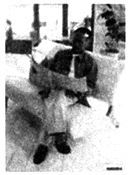
題目列表(包括答案和解析)
| |||||||||||||||||||||||||||||||||||||||||||||||||||||||||||||||||||||||||
| |||||||||||||||||||||||||||||||||||||||||||||
| |||||||||||||||||||||||||||||||||||||||||||||||||||||||||||||||||||||||||
You will have a lot of reading to do in this grade this year. You can do more of it in less time if you learn to read rapidly.

Perhaps you have been told about some habits
(習(xí)慣)which keep a person from reading fast and have been strongly asked to break those habits which you might have.Do you still have any of these bad habits? Check yourself by answering
“yes”or“no”to these questions.(1) Do you move your lips
(嘴唇)when reading silently?(2) Do you point to words with your finger as you read?
(3) Do you move your head from side to side as you read?
(4) Do you read one word at a time?
If you answer
“yes”to any of these questions, start at once to break the habit. If you move your lips, hold your fingers over them, or hold a piece of paper between your lips while you are reading. Then if your lips move, your will know it and can stop them.If you point to words, hold the two sides of your book, one side with your left hand, the other side with your right hand. Then you won't have a free finger to use in pointing while reading. If you move your head, place your chin
(下巴)in one hand and hold your head still(靜止不動的).If you read no more than one or two or three words at a time, you need to work very hard in learning to take in
(吸收)more words at each glance(一瞥)as your eyes travel across the lines of words.Even if you do rather fast now, you can learn to read even faster. As you probably have been told, the secret of fast reading is to take in whole groups of words as each glance. Read in through groups and force
(迫使)your eyes along the lines of words as fast as you can to make them go. Anyone who practices doing these things will be able to read faster.(1)You may hold your fingers over your lips while reading so as __________.
[ ]
A
.to tell others to be silentB
.to feel whether your lips move or notC
.to hold a piece of paper between themD
.to keep yourself from talking to others(2)When you read, __________.
[ ]
A
.don't keep your head stillB
.don't hold your books with your handsC
.don't stand up near a deskD
.don't use your finger to point to words(3)If you learn to read fast, __________.
[ ]
A
.you can read more in less timeB
.you can write fasterC
.you can understand betterD
.you can read less in more time(4)You must __________ those habits that we are talking about in this reading.
[ ]
|
A .remember |
B .have |
|
C .get rid of |
D .keep |
(5)This reading is mainly about __________.
[ ]
A
.the way of reading fastB
.the importance of fast readingC
.the bad habits in readingD
.how to speak quickly
| |||||||||||||||||||||||||||||||||||||||||||||||||||||||||||||||||||||||||
湖北省互聯(lián)網(wǎng)違法和不良信息舉報(bào)平臺 | 網(wǎng)上有害信息舉報(bào)專區(qū) | 電信詐騙舉報(bào)專區(qū) | 涉歷史虛無主義有害信息舉報(bào)專區(qū) | 涉企侵權(quán)舉報(bào)專區(qū)
違法和不良信息舉報(bào)電話:027-86699610 舉報(bào)郵箱:58377363@163.com